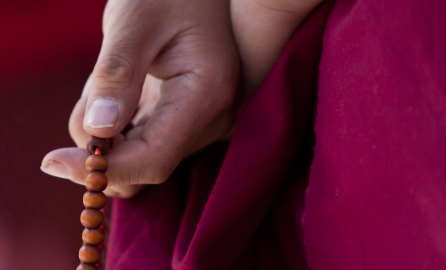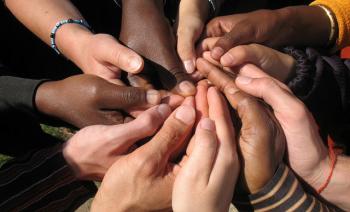@media (max-width: 1333px) { .mobile-img { margin-left:0px !important; } .mobile-video { margin-right: 0px !important; } .mobile-quote, .mobile-table { display:none; } } .drop-cap { font-size: 6em; float: left; line-height: 75px; padding-right: 8px; padding-left: 0; } .drop-cap-2 { font-size: 3em; float: left; line-height: 35px; padding-left: 0; }
Faith is irreducible – but an understanding of the complexities of religion is important to navigate its more practical aspects.
"Communities of believers form great networks and are instruments of social understanding,” said Alberto Melloni, Professor at the University of Modena-Reggio Emilia.
Understanding the historical importance of these beliefs – and their impact on people’s lives – is a must when engaging with faith-based actors, he explained.
Melloni spoke at the first of a series of Agora on Religion and Development lunchtime talks, facilitated by the Directorate-General for International Cooperation and Development’s Unit on Gender Equality, Human Rights and Democratic Governance (DEVCO B1).
The goal of these? To provide a space for learning and discussion of the connections between societal development, religion, and culture.
Watch Alberto Melloni discuss religious illiteracy and how it can be addressed:
Capacity4dev (C4D): What should development practitioners keep in mind when looking at religion?
Alberto Melloni (AM): When we talk of religion, we have to keep in mind that we are thinking, speaking and working in a situation of deep and profound religious illiteracy. The references, the language, the vocabulary and the intellectual framework are far from the experience of many; so the risk is to reduce religion to a response to sociological needs, or to a political factor with theological coverage.
To restore the knowledge and the research necessary to understand the religious experience as something deserving attention is one of the most important things in order to avoid reducing and brutalising interpretation, or to remain a victim, hypnotised by the myth and illusions coming from fundamentalism.
C4D: You’ve previously spoken of a ‘religious climate change’. What do you mean by this, and how is it connected to religious illiteracy?
| Alberto Melloni is a Professor of the History of Christianity and the University of Modena-Reggio Emilia, Director of the Fondazione per le scienze religiose “Giovanni XXIII” in Bologna, Principle Investigator within the European Research Infrastructures (Horizon 2020) Melloni further created the European Academy of Religion in 2016 and holds the UNESCO Chair for Religious Pluralism and Peace. |
AM: I have the sense that we are in the midst of a religious climate change and a religious global warming. The fundamentalist temperature of religious communities is growing and with it the possibility of religious illiteracy being disseminated through fundamentalist ideas and oversimplifications.
The positive interplay between scholars, decisions makers, political leaders and public opinion is the circular movement of ideas that should be reopened in order to “treat” religious illiteracy.
If untreated, religious illiteracy increases the possibility of hijacking the imagination, the representation, and even the life of religious communities in countries all around the world.
C4D: What is the role of interreligious dialogue in all this?
AM: Interreligious dialogue is good – it’s much better to talk than to kill each other. But one should not be naïve and ignore that in many circumstances, interreligious dialogue is simply a sort of ceremony; that religious leaders are asked to come on stage, to say that religion is good, that religious people are good, and that all religions are for peace.
Historically speaking, it has not been the case. Religion has produced war and violence. The problem is to determine how, the alternative to killing – that is to have compassion – can be measured and produced.
Religious leaders should look at how to multiply opportunities for training, education, and knowledge-sharing for their intermediate leaders and practitioners – and also to the possibility to share their religious alphabets with each other.
C4D: How can a more positive interplay be promoted?
“I have the sense that education is the real battlefield, though a misinterpretation of education could reproduce the same simplisms and stereotypes.”
AM: I have the sense that education is the real battlefield, though a misinterpretation of education could reproduce the same simplisms and stereotypes. Teaching comparative religion as a way to treat religious illiteracy is not so simple, unfortunately.
There needs to be a long-term process that could help a new generation of people, who are not from a religious background, develop a new sense of understanding of the other and how to position themselves in the religious landscape. This is true for individuals and communities; it means trusting and investing in reopening this corridor between education and research.
As a historian, I have a postulate that to remember the mistakes of the past does not prevent their repetition – on the contrary. The religious traditions and the religious hermeneutics of the sacred texts are a repository of opportunities, alternatives, and ethical dilemmas. The direction, in one sense or the other, is a matter of ethical and spiritual decision in many circumstances.
To understand the many opportunities and choices throughout the history of religion is a way to implement a transmission of a positive attitude among the next generation. If you don’t do this and you simply think that preaching values, or preaching the duty to remember is enough, you will have to face the same issue in a generation.
This article was written by Craig Hill, Journalist and Content Editor at Capacity4dev.



Log in with your EU Login account to post or comment on the platform.